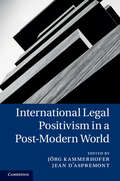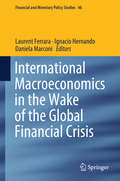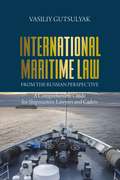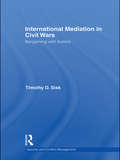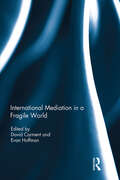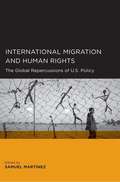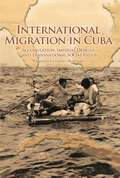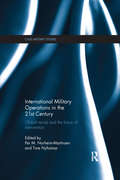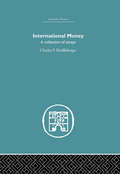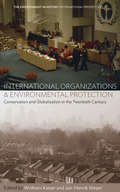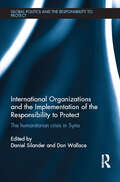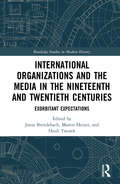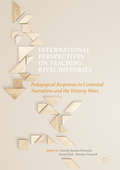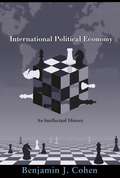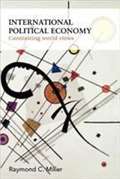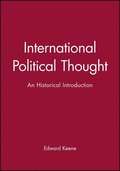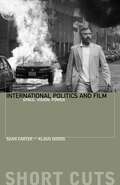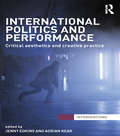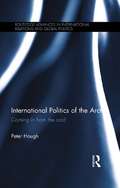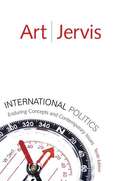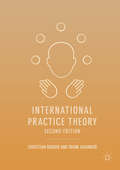- Table View
- List View
International Legal Positivism in a Post-Modern World
by Jörg Kammerhofer Jean D'AspremontInternational Legal Positivism in a Post-Modern World provides fresh perspectives on one of the most important and most controversial families of theoretical approaches to the study and practice of international law. The contributors include leading experts on international legal theory who analyse and criticise positivism as a conceptual framework for international law, explore its relationships with other approaches and apply it to current problems of international law. Is legal positivism relevant to the theory and practice of international law today? Have other answers to the problems of international law and the critique of positivism undermined the positivist project and its narratives? Do modern forms of positivism, inspired largely by the theoretically sophisticated jurisprudential concepts associated with Hans Kelsen and H. L. A. Hart, remain of any relevance for the international lawyer in this 'post-modern' age? The authors provide a wide variety of views and a stimulating debate about this family of approaches.
International Liquidity and the Financial Crisis
by William A. AllenIn the ongoing financial crisis, policy makers have for the most part appeared to be reactive, formulating emergency solutions as events unfold. However, in contrast to their performance during the Great Depression, central banks around the world, led by the Federal Reserve, acted decisively following the collapse of Lehman Brothers and provided huge injections of liquidity into the financial markets, thereby preventing a far worse outcome. International Liquidity and the Financial Crisis compares the 2008 crisis with the disaster of 1931 and explores the similarities and differences. It considers the lasting effects of the crisis on international liquidity, the possibilities for an international lender of last resort, and the enlargement of the International Monetary Fund after the crisis. It shows that there is no clear demarcation between monetary and macro-prudential policies, and discusses how central banks need to adapt to a new environment in which global liquidity is much scarcer.
International Macroeconomics in the Wake of the Global Financial Crisis (Financial and Monetary Policy Studies #46)
by Daniela Marconi Laurent Ferrara Ignacio HernandoThis book collects selected articles addressing several currently debated issues in the field of international macroeconomics. They focus on the role of the central banks in the debate on how to come to terms with the long-term decline in productivity growth, insufficient aggregate demand, high economic uncertainty and growing inequalities following the global financial crisis. Central banks are of considerable importance in this debate since understanding the sluggishness of the recovery process as well as its implications for the natural interest rate are key to assessing output gaps and the monetary policy stance. The authors argue that a more dynamic domestic and external aggregate demand helps to raise the inflation rate, easing the constraint deriving from the zero lower bound and allowing monetary policy to depart from its current ultra-accommodative position. Beyond macroeconomic factors, the book also discusses a supportive financial environment as a precondition for the rebound of global economic activity, stressing that understanding capital flows is a prerequisite for economic-policy decisions.
International Maritime Law from the Russian Perspective: A Comprehensive Guide for Shipmasters, Lawyers and Cadets
by Vasiliy GutsulyakThis book is one of the most comprehensive guides to international maritime law from the Russian perspective. It consists of three relatively independent sections: Russian Maritime Law, International Public Maritime Law, and International Private Maritime Law.°First section discusses the development of the maritime law as a branch of the Russian law. It examines concepts and sources of the Russian federal laws, secondary legislation and customs, including the influences guiding the future of Russian law of the sea.°The second section examines International Public Maritime Law including the principles, sources, subjects, as well legal status of the vessel, including the vessel's state flag, her name, state registration, the problem of "flags of convenience", vessel's documents, the crew, and the master. This section further details the current international legal regime of maritime spaces, provisions concerning legal protection of marine environments, ensuring navigation safety, international legal regulation of the work of seamen, international inter-governmental marine organizations, and settlement of international public marine disputes.°The third section is devoted to International Private Maritime Law and discusses its principles and sources, conflict-of-law rules, structure and types, and the main choice-of-law principles used today in international private maritime law. This section also discusses the following institutions and sub-branches within international private maritime law including: carriage of cargoes and passengers by sea, general average, salvage, collisions of vessels, marine insurance, limitation of liability, international non-governmental maritime organizations, and settlement of international private marine disputes.
International Mediation in Civil Wars: Bargaining with Bullets (Routledge Studies in Security and Conflict Management)
by Timothy D SiskThis book evaluates the role of international mediators in bringing civil wars to an end and makes the case for ‘powerful peacemaking’ – using incentives and sanctions – to leverage parties into peace. As internal violence within countries is a hugely significant threat to international peace in the post-Cold War era, the question of how these wars end has become an urgent research and policy question. This volume explores a critical aspect of peacemaking that has yet to be sufficiently evaluated: the turbulent period beyond the onset of formal or open negotiations to end civil wars and the clinching of an initially sustainable negotiated settlement. The book argues that the transnational flow of weapons, resources, and ideas means that when civil wars today end, they are more likely to do so at the negotiating table than on the battlefield. It uses bargaining theory to develop an analytical framework to evaluate peace processes – moving from stalemate in wars to negotiated settlement – and it rigorously analyses the experiences of five cases of negotiated transitions from war and the role of international mediators: South Africa, Liberia, Burundi, Kashmir, and Sri Lanka.
International Mediation in a Fragile World
by David Carment and Evan HoffmanContributions to this volume consider the importance of mediation in violent conflict. Practical and applied, this publication will be of interest to scholars, academics, policymakers and practitioners. It was originally published as a special issue of Canadian Foreign Policy Journal.
International Migration and Human Rights: The Global Repercussions of U.S. Policy
by Samuel MartínezThis book contains essays divided into four sections, each section developing a different angle on the repercussions of U.S. policy for the rights of migrants at different points in history and in various parts of the world.
International Migration in Cuba: Accumulation, Imperial Designs, and Transnational Social Fields
by Alejandro Portes Margarita Cervantes-RodríguezSince the arrival of the Spanish conquerors at the beginning of the colonial period, Cuba has been hugely influenced by international migration. Between 1791 and 1810, for instance, many French people migrated to Cuba in the wake of the purchase of Louisiana by the United States and turmoil in Saint-Domingue. Between 1847 and 1874, Cuba was the main recipient of Chinese indentured laborers in Latin America. During the nineteenth century as a whole, more Spanish people migrated to Cuba than anywhere else in the Americas, and hundreds of thousands of slaves were taken to the island. The first decades of the twentieth century saw large numbers of immigrants and temporary workers from various societies arrive in Cuba. And since the revolution of 1959, a continuous outflow of Cubans toward many countries has taken place—with lasting consequences.In this book, the most comprehensive study of international migration in Cuba ever undertaken, Margarita Cervantes-Rodríguez aims to elucidate the forces that have shaped international migration and the involvement of the migrants in transnational social fields since the beginning of the colonial period. Drawing on Fernand Braudel’s concept of longue durée, transnational studies, perspectives on power, and other theoretical frameworks, the author places her analysis in a much wider historical and theoretical perspective than has previously been applied to the study of international migration in Cuba, making this a work of substantial interest to social scientists as well as historians.
International Military Operations in the 21st Century: Global Trends and the Future of Intervention (Cass Military Studies)
by Per M. Norheim-Martinsen Tore NyhamarThis book examines the challenges that military forces will face in multinational operations in the 21st century. Expanding on Rupert Smith’s The Utility of Force, the volume assesses the changing parameters within which force as a political instrument is ultimately carried out. By analysing nine carefully selected mission types, the volume presents a comprehensive analysis of key trends and trajectories. Building upon this analysis, the contributors break the trends and parameters down into real and potential tasks and mission types in order to identify concrete implications for military forces in future multinational operations. The context of military intervention in conflicts and crises around the world is rapidly evolving. Western powers’ shrinking ability and desire to intervene makes it pertinent to analyse how the cost of operations can be reduced and, how they can be executed more intelligently in the future. New challenges to international military operations are arising and this book addresses these challenges by focusing on three key areas of change: 1) An increasingly urbanised world; 2) The changing nature of missions; 3) The commercial availability of new technologies. In answering these questions and embracing some of the insights of a growing field of future studies, the volume presents an innovative perspective on future international military operations. This book will be of much interest to students of international intervention, military and strategic studies, war and conflict studies, security studies and IR in general.
International Money: A Collection of Essays
by Charles P. KindlerbergerThis book was first published in 1981.
International Organizations and Environmental Protection: Conservation and Globalization in the Twentieth Century (Environment in History: International Perspectives #11)
by Wolfram Kaiser Jan-Henrik MeyerPollution, resource depletion, habitat management, and climate change are all issues that necessarily transcend national boundaries. Accordingly, they and other environmental concerns have been a particular focus for international organizations from before the First World War to the present day. This volume is the first to comprehensively explore the environmental activities of professional communities, NGOs, regional bodies, the United Nations, and other international organizations during the twentieth century. It follows their efforts to shape debates about environmental degradation, develop binding intergovernmental commitments, and-following the seminal 1972 Conference on the Human Environment-implement and enforce actual international policies.
International Organizations and the Implementation of the Responsibility to Protect: The Humanitarian Crisis in Syria (Global Politics and the Responsibility to Protect)
by Daniel Silander and Don WallaceThis book seeks to understand the obligation of the international community to implement the principles of the Responsibility to Protect (R2P). With a focus on the humanitarian crisis in Syria, the volume examines what formal responsibility and actual capability international institutions have to protect and prevent civilians from systematic mass atrocities and presents an analysis of several prominent international organizations (IOs). Each chapter focuses on a specific organization and explores their formal responsibilities and how these pertain to the obligations of the R2P. Existing capabilities and actual abilities to address the challenges of R2P are analysed by looking at these issues before, during, and after the occurrence of the humanitarian crisis in Syria. With the UN not fully engaged in the Syrian conflict, the systematic human rights abuses have engendered greater attention on other organizations. This volume argues that if the UN Security Council’s inactions result in an abdication of responsibilities under the UN Charter, there should not only be a discussion of how the UN must alter its approach, but also an examination of whether there are alternative R2P paths for other MNOs to take in the name of international peace and human security. This book will be of much interest to students of R2P, humanitarian intervention, international organisations, Middle Eastern politics and security studies.
International Organizations and the Media in the Nineteenth and Twentieth Centuries: Exorbitant Expectations (Routledge Studies in Modern History)
by Jonas Brendebach Martin Herzer Heidi J.S. TworekInternational Organizations and the Media in the Nineteenth and Twentieth Centuries is the first volume to explore the historical relationship between international organizations and the media. Beginning in the early nineteenth century and coming up to the 1990s, the volume shows how people around the globe largely learned about international organizations and their activities through the media and images created by journalists, publicists, and filmmakers in texts, sound bites, and pictures. The book examines how interactions with the media are a formative component of international organizations. At the same time, it questions some of the basic assumptions about how media promoted or enabled international governance. Written by leading scholars in the field from Europe, North America, and Australasia, and including case studies from all regions of the world, it covers a wide range of issues from humanitarianism and environmentalism to Hollywood and debates about international information orders. Bringing together two burgeoning yet largely unconnected strands of research—the history of international organizations and international media histories—this book is essential reading for scholars of international history and those interested in the development and impact of media over time.
International Perspectives on Publishing Platforms: Image, Object, Text (Digital Research in the Arts and Humanities)
by Meghan ForbesWith large-scale scholarly projects dedicated to digitizing print-based magazines and a concurrent turn towards digital mapping and data visualization, periodicals that were once accessible only in the archive now have the capacity to reach a wider audience, and make visible previously overlooked networks and connections enacted within and across the magazines. International Perspectives on Publishing Platforms: Image, Object, Text offers a unique contribution to the field of periodical studies, while also broadening the scope of purview to consider related content with regards to other relevant printed matter and cultural products, as well as digital archiving strategies. Including interdisciplinary contributions from academics around the world, the volume presents a wide range of approaches to periodicals and printed matter from Africa, Asia, Europe, the Middle East, Latin America, and the Caribbean. Questions of material print culture and the digital realm are considered both via theoretical and more empirical approaches. As a whole, the book considers the pluralism of perspectives that the study of periodicals and printed matter contribute to our historical understanding of various political and social issues, and also devotes attention to the ways in which digital archiving projects can be instrumentalized as a strategy for filling in gaps in the historical record. International Perspectives on Publishing Platforms should be of great interest to researchers, academics and postgraduates engaged in the study of periodicals, publishing, book history, world literature, digital humanities, media, visual and material culture.
International Perspectives on Teaching Rival Histories
by Anna Clark Henrik Åström Elmersjö Monika VinterekThis book presents a survey of approaches to dealing with 'rival histories' in the classroom, arguing that approaching this problem requires great sensitivity to differing national, educational and narrative contexts. Contested narratives and disputed histories have long been an important issue in history-teaching all over the world, and have even been described as the 'history' or 'culture' wars. In this book, authors from across the globe ponder the question "what can teachers do (and what are they doing) to address conflicting narratives of the same past?", and puts an epistemological issue at the heart of the discussion: what does it mean for the epistemology of history, if it is possible to teach more than one narrative? Divided into three sections that deal with historical cultures, multicultural societies and multiperspectivity, the chapters of the book showcase that dealing with rival histories is very much dependent on context, and that diverse teaching traditions and societal debates mean that teachers' abilities in engaging with the teaching of rival narratives are very different. The volume will be compelling reading for students and researchers in the fields of education, history, sociology and philosophy, as well as practising teachers.
International Political Economy: A Reader
by Tsuneo Akaha Kendall W. Stiles"International Policy Economy: A Reader" presents discussions of economic policy issues most frequently addressed by International Policy Economy (IPE) analysts and policy makers: trade, finance, investment, and aid. These policy concerns need to be understood against the backdrop of broad global trends such as changing international leadership patterns, structural changes in the world economy, increasingly crucial relationships between economics and national and international security, and international order.
International Political Economy: An Intellectual History (The\library Of Essays In International Relations Ser.)
by Benjamin J. CohenThe field of international political economy gained prominence in the early 1970s--when the Arab oil embargo and other crises ended the postwar era of virtually unhindered economic growth in the United States and Europe--and today is an essential part of both political science and economics. This book offers the first comprehensive examination of this important field's development, the contrasting worldviews of its American and British schools, and the different ways scholars have sought to meet the challenges posed by an ever more complex and interdependent world economy. Benjamin Cohen explains the critical role played by the early "intellectual entrepreneurs," a generation of pioneering scholars determined to bridge the gap between international economics and international politics. Among them were brilliant thinkers like Robert Keohane, Susan Strange, and others whose legacies endure to the present day. Cohen shows how their personalities and the historical contexts in which they worked influenced how the field evolved. He examines the distinctly different insights of the American and British schools and addresses issues that have been central to the field's development, including systemic transformation, system governance, and the place of the sovereign state in formal analysis. The definitive intellectual history of international political economy, this book is the ideal volume for IPE scholars and those interested in learning more about the field.
International Political Economy: Contrasting World Views
by Raymond C. MillerAn essential read on international political economy, global governance and international economics, this book provides illustrative case studies, classical and contemporary debates with historical and theoretical explanation.
International Political Thought: A Historical Introduction
by Edward KeeneThis volume offers an accessible and wide-ranging introduction to the history of international political thought. Taking as its starting-point the various concepts people have used to think about differences between political communities, the book explores changing perceptions of international politics from antiquity to the twentieth century. As well as discussing well-known themes such as relations between independent sovereign states and the tension between raison d'etat and a universal code of natural law, it also examines less familiar ideas which have influenced the development of international political thought such as the distinction between civilization, national culture and barbarism, religious attitudes towards infidels, and theories about racial difference and imperialism. Among the key thinkers covered are Thucydides, Machiavelli, Hobbes, Kant, Marx and Morgenthau, alongside less commonly studied figures such as Herodotus, Pope Innocent IV, Herder, Constant and Zimmern. Each chapter concludes with a guide to further reading which will help students to develop a more detailed understanding of the subject. Written with the beginner student in mind, this lively textbook is an ideal introduction for anyone studying international political thought.
International Politics and Film
by Sean CarterInternational Politics and Film introduces readers to the representational qualities of film but also draws attention to how the relationship between the visual and the spatial is constitutive of international politics. Using four themes -- borders, the state of exception, homeland and distant others -- the territorial and imaginative dimensions of international affairs in particular are highlighted. But theis volume also makes clear that international politics is not just something 'out there'; film helps us better understand how it is also part of everyday life within the state -- affecting individuals and communities in different ways depending on axes of difference such as gender, race, class, age, and ethnicity.
International Politics and Film: Space, Vision, Power (Short Cuts)
by Klaus Dodds Sean CarterInternational Politics and Film introduces readers to the representational qualities of film but also draws attention to how the relationship between the visual and the spatial is constitutive of international politics. Using four themes—borders, the state of exception, homeland and distant others—the territorial and imaginative dimensions of international affairs in particular are highlighted. But this volume also makes clear that international politics is not just something "out there"; film helps us better understand how it is also part of everyday life within the state—affecting individuals and communities in different ways depending on axes of difference such as gender, race, class, age, and ethnicity.
International Politics and Performance: Critical Aesthetics and Creative Practice (Interventions)
by Jenny Edkins Adrian KearIn recent years we have witnessed an increasing convergence of work in International Politics and Performance Studies around the troubled, and often troubling, relationship between politics and aesthetics. Whilst examination of political aesthetics, aesthetic politics, and politics of aesthetic practice has been central to research in both disciplines for some time, the emergence of a distinctive ‘performative turn’ in International Politics and a critical return to the centrality of politics and the concept of ‘the political’ in Performance Studies highlights the importance of investigating the productivity of bringing the methods and approaches of the two fields of enquiry into dialogue and mutual relation. Exploring a wide range of issues including rioting, youth-driven protests, border security practices and the significance of cultural awareness in war, this text provides an accessible and cutting edge survey of the intersection of international politics and performance examining issues surrounding the politics of appearance, image, event and place; and discusses the development and deployment of innovative critical and creative research methods, from auto-ethnography to site-specific theatre-making, from philosophical aesthetics to the aesthetic thought of new securities scenario-planning. The book’s focus throughout is on the materiality of performance practices—on the politics of making, spectating, and participating in a variety of modes as political actors and audiences—whilst also seeking to explicate the performative dynamics of creative and critical thinking. Structured thematically and framed by a detailed introduction and conclusion, the focus is on producing a dialogue between contributors and providing an essential reference point in this developing field. This work is essential reading for students of politics and performance and will be of great interest to students and scholars of IR, performance studies and cultural studies.
International Politics of the Arctic: Coming in from the Cold (Routledge Advances in International Relations and Global Politics)
by Peter HoughThis book offers a wide-ranging account of the emerging issues of international politics in the Artic, and the emerging Geopolitical debates that surround the region. In this thorough but accessible book covering environmental issues, the author examines the Geopolitics of emerging land and resource disputes and the rise of both nationalist and pan-Arctic movements in the region. Whereas existing literature on the politics of the Arctic tends to focus either on the environment or on Geopolitical interests, this book considers both of these themes in addition to the politics of the region’s indigenous peoples and provides an overview on the emerging issues of international politics in the Arctic. The book makes full use of pedagogic features such as maps, diagrams, timelines, biographies and boxes highlighting key concepts and issues in order to make this an accessible book for both students and scholars alike. This book will be of interest to students and scholars of International Relations, Arctic Politics, Environmental Politics and European Politics.
International Politics: Enduring Concepts And Contemporary Issues, 10th Edition
by Robert J. Art Robert JervisFifty papers by scholars of economics, international relations, and related fields discuss the anarchic structure of international relations, the use of force, the international political economy, and contemporary world politics. Current issues like international cooperation, nuclear proliferation, globalization, terrorism, failed states, and climate change receive special attention.
International Practice Theory: Core Approaches
by Frank Gadinger Christian BuegerInternational Practice Theory is the definitive introduction to the practice turn in world politics, providing an accessible, up-to-date guide to the approaches, concepts, methodologies and methods of the subject. Situating the study of practices in contemporary theory and reviewing approaches ranging from Bourdieu’s praxeology and communities of practice to actor-network theory and pragmatic sociology, it documents how they can be used to study international practices empirically. The book features a discussion of how scholars can navigate ontological challenges such as order and change, micro and macro, bodies and objects, and power and critique. Interpreting practice theory as a methodological orientation, it also provides an essential guide for the design, execution and drafting of a praxiographic study.
